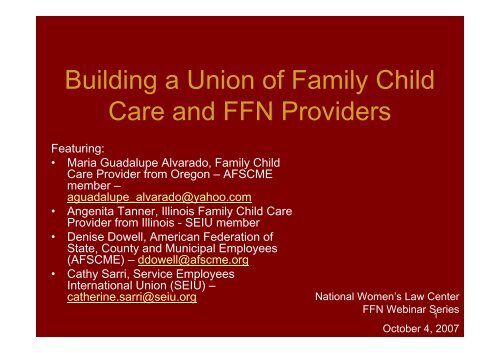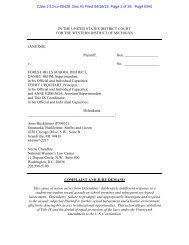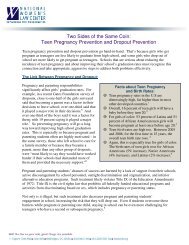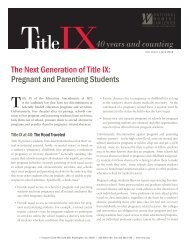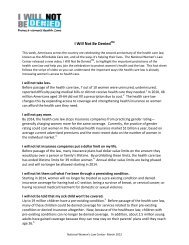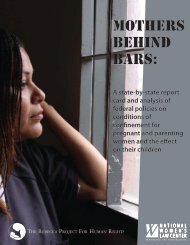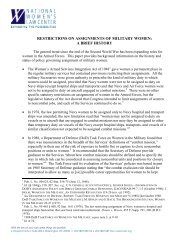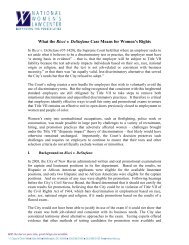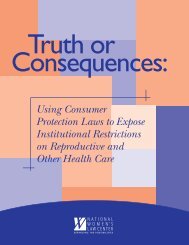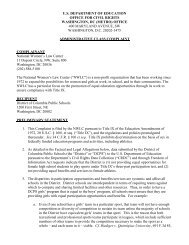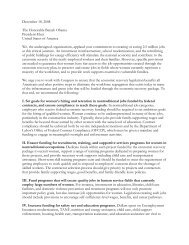Building a Union of Family Child Care and FFN Providers - National ...
Building a Union of Family Child Care and FFN Providers - National ...
Building a Union of Family Child Care and FFN Providers - National ...
Create successful ePaper yourself
Turn your PDF publications into a flip-book with our unique Google optimized e-Paper software.
<strong>Building</strong> a <strong>Union</strong> <strong>of</strong> <strong>Family</strong> <strong>Child</strong><br />
<strong>Care</strong> <strong>and</strong> <strong>FFN</strong> <strong>Providers</strong><br />
Featuring:<br />
• Maria Guadalupe Alvarado, <strong>Family</strong> <strong>Child</strong><br />
<strong>Care</strong> Provider from Oregon – AFSCME<br />
member –<br />
aguadalupe_alvarado@yahoo.com<br />
• Angenita Tanner, Illinois <strong>Family</strong> <strong>Child</strong> <strong>Care</strong><br />
Provider from Illinois - SEIU member<br />
• Denise Dowell, American Federation <strong>of</strong><br />
State, County <strong>and</strong> Municipal Employees<br />
(AFSCME) – ddowell@afscme.org<br />
• Cathy Sarri, Service Employees<br />
International <strong>Union</strong> (SEIU) –<br />
catherine.sarri@seiu.org<br />
<strong>National</strong> Women’s Law Center<br />
<strong>FFN</strong> Webinar Series<br />
1<br />
October 4, 2007
Role <strong>of</strong> <strong>Union</strong>s<br />
• Build a provider-led movement to win the<br />
right to bargain with the state over<br />
improvements <strong>and</strong> new investment in<br />
child care.<br />
• Partner with child care advocates to build<br />
public momentum for a solution to the<br />
child care crisis.<br />
• Elect politicians who support working<br />
families <strong>and</strong> affordable, quality child care<br />
for all.
Steps to Collective Bargaining<br />
• Create the legal authority to have a union, be<br />
recognized as a bargaining agent through card check<br />
or election <strong>and</strong> bargain through executive order <strong>and</strong><br />
state legislation.<br />
• Certify the union as representative through an<br />
election or a count <strong>of</strong> authorization cards<br />
• Negotiate a Contract – <strong>Providers</strong> complete a<br />
bargaining survey <strong>and</strong> elect a committee <strong>of</strong><br />
representatives (bargaining committee) who<br />
negotiate with the state. <strong>Providers</strong> covered by the<br />
contract vote to approve the contract.
Who are we organizing?<br />
• Collective bargaining over rates <strong>and</strong><br />
benefits covers regulated family child care<br />
providers <strong>and</strong> “<strong>Family</strong>, friend <strong>and</strong><br />
neighbor” (<strong>FFN</strong> - providers exempt from<br />
regulation) who receive public funds.<br />
• Meet <strong>and</strong> discuss regulatory issues<br />
affecting state-regulated family providers<br />
(private pay <strong>and</strong> those who receive public<br />
funds)
Definition <strong>of</strong> the Bargaining<br />
Unit<br />
• <strong>Providers</strong> may be grouped based for<br />
representation <strong>and</strong> bargaining purposes<br />
based on whether or not they have an<br />
economic interest with the state, based on<br />
their regulatory status, <strong>and</strong> political<br />
considerations.
States with State-authorized<br />
Representation <strong>and</strong> Bargaining<br />
• Illinois (2005)<br />
• Washington (2006)<br />
• New Jersey (2006)<br />
• Iowa (2006)<br />
• Michigan (2006)<br />
• Oregon (2007)<br />
• New York (2007)<br />
• Maryl<strong>and</strong> (2007)<br />
• Kansas (2007)<br />
• Maine (2007-pending)<br />
• Pennsylvania (2007–pending)
Illinois Agreement - SEIU<br />
• Illinois was the first state to complete negotiations <strong>and</strong> sign a statewide contract for homebased<br />
child care providers (December 2005).<br />
• One unit <strong>of</strong> licensed <strong>and</strong> <strong>FFN</strong> state-subsidized providers.<br />
• SEIU <strong>and</strong> State agreed to a three-year estimated $250 million contract, includes:<br />
‣ Rate increases: FCC <strong>and</strong> <strong>FFN</strong> providers will receive 4 rate increases totaling 35% over<br />
three years. FCC providers who meet certain training or quality st<strong>and</strong>ards receive an<br />
additional 5-20% increase.<br />
‣ Health Insurance: The state will contribute $27 million toward premiums for subsidized<br />
FCC <strong>and</strong> <strong>FFN</strong> providers to obtain health insurance beginning the third year.<br />
‣ Grievance Procedures: Payments to subsidized FCC <strong>and</strong> <strong>FFN</strong> providers must be<br />
processed in a timely fashion <strong>and</strong> grievances may be settled by binding arbitration.<br />
‣ Labor Management Committee.<br />
• An additional $18 million will increase rates for child care centers.
Legislative <strong>and</strong> Policy<br />
Successes<br />
• Working with advocates to:<br />
‣ Exp<strong>and</strong> child access to preschool programs – especially<br />
amongst <strong>FFN</strong> providers - $315 million in new funding.<br />
‣ Eliminate zoning restrictions that prevent licensed family<br />
child care providers from operating in neighborhoods.<br />
‣ Stop cuts to the child care subsidy program.<br />
‣ Exp<strong>and</strong> access to the federal food program.<br />
‣ Exp<strong>and</strong> parent eligibility from 150% FPL to 185% FPL.<br />
• Increased subsidy rates have lead to more licensed<br />
providers taking children receiving subsudies.
Washington Agreement - SEIU<br />
• SEIU <strong>and</strong> State <strong>of</strong> Washington reached<br />
agreement in November 2006.<br />
• Two bargaining units: (1) subsidized FCC <strong>and</strong><br />
<strong>FFN</strong> providers; (2) FCC providers who do not<br />
receive subsidies.<br />
• FCC providers not receiving subsidies have the<br />
right to union representation only for purposes <strong>of</strong><br />
“negotiated rule making.”
Washington Agreement - SEIU<br />
• Estimated $50 million, two-year agreement approved by the legislature:<br />
‣ Subsidy rate increases: FCC providers will receive a 10% increase over 2<br />
years, plus additional financial incentives for infants <strong>and</strong> care during<br />
nonst<strong>and</strong>ard hours. <strong>FFN</strong> providers will receive uniform rates for each child<br />
in their care (instead <strong>of</strong> the lower rate now in effect for siblings <strong>of</strong> the first<br />
child), plus a 7% increase in that uniform rate over 2 years.<br />
‣ <strong>FFN</strong> providers who decide to get licensed will receive a $250 bonus. <strong>FFN</strong><br />
providers who receive 10 hours <strong>of</strong> training will receive a $600 bonus per<br />
year.<br />
‣ Health Insurance: Beginning in 2008, subsidized FCC providers caring for at<br />
least four children receiving child care subsidies will have access to health<br />
insurance coverage. The state will contribute up to $555 per month per<br />
provider. The total amount is capped.<br />
‣ Other supports for both subsidized FCC <strong>and</strong> <strong>FFN</strong> providers:<br />
o Increased training opportunities.<br />
o <strong>FFN</strong> providers receiving subsidies will qualify for the <strong>Child</strong> <strong>and</strong> Adult<br />
<strong>Care</strong> Food Program.<br />
• The governor’s budget includes an additional $32 million to increase<br />
reimbursement rates for child care centers.<br />
• Labor-Management Committee <strong>and</strong> grievance-arbitration procedure.
Legislative <strong>and</strong> Policy<br />
Successes<br />
• Working with advocates to:<br />
‣ Win additional funding <strong>and</strong> provider voice in<br />
implementing the new QRIS system.<br />
‣ Increase access <strong>of</strong> <strong>FFN</strong> providers to “play <strong>and</strong> learn<br />
programs.”<br />
• Working with the State <strong>and</strong> CCRRs to develop<br />
an <strong>FFN</strong> training program.<br />
• Opened <strong>FFN</strong> access to the CACFP.<br />
• Licensed providers, advocates <strong>and</strong> parents are<br />
reviewing child care licensing to make them<br />
more user-friendly.
Oregon Agreement – AFSCME<br />
<strong>and</strong> SEIU<br />
• AFSCME <strong>and</strong> SEIU, representing two<br />
different groups <strong>of</strong> providers, have each<br />
signed agreements with state agencies.<br />
• State agreements approved by legislature<br />
as part <strong>of</strong> the 2007 budget process.
Oregon Agreement - Licensed<br />
• Subsidy rate increases: Increase rates for FCC providers to the 75 th percentile <strong>of</strong><br />
2006 market rates. <strong>Child</strong> care centers will receive the same rate increase.<br />
• Payment Procedures: Requires DHS to make improvements.<br />
• Eligibility Expansion: Restore the eligibility for subsidized child care to 185% <strong>of</strong> the<br />
federal poverty level (from 150%).<br />
• Reductions in Parent Co-payments: Both contracts call on DHS to lower copayments<br />
by 20%.<br />
• Health Insurance: In the AFSCME agreement the union <strong>and</strong> the agencies agreed to<br />
“work together to explore” ways to help FCC providers “access affordable,<br />
comprehensive health insurance coverage.<br />
• Provider Bill <strong>of</strong> Rights: Establishes procedural protections for FCC providers in their<br />
dealings with state regulatory agencies.<br />
‣ Right to have a union representative present during interactions with regulators.<br />
‣ Right to have complaints be found “valid” before the provider’s<br />
registration/certification may be revoked.<br />
• Training: FCC providers will have a larger voice in training.
Oregon Agreement - <strong>FFN</strong><br />
• Subsidy rate increases: Increase rates for <strong>FFN</strong> providers to 88% <strong>of</strong> the 75 th<br />
percentile <strong>of</strong> 2006 market,<br />
• Training Incentives: Work with CCRR to develop training program <strong>and</strong> make<br />
training more accessible <strong>and</strong> affordable. “Enhanced” reimbursement rates – 7%<br />
increase (for meeting certain training requirements) to 95% <strong>of</strong> the 75 th percentile.<br />
<strong>FFN</strong> providers can attend all trainings <strong>of</strong>fered by the CCRR for free <strong>and</strong> will<br />
receive a stipend to cover the cost <strong>of</strong> substitute care <strong>and</strong> transportation. DHS is<br />
creating an orientation designed specifically for <strong>FFN</strong> providers.<br />
• Payment Procedures: Direct deposit <strong>and</strong> expedited payments<br />
• Eligibility Expansion: DHS should include in its budget request funds to restore<br />
the eligibility for subsidized child care to 185% <strong>of</strong> the federal poverty level (from<br />
150%).<br />
• Reductions in Parent Co-payments: DHS to lower co-payments by 20%.<br />
• Payment Processes: The SEIU/<strong>FFN</strong> contract addresses procedures for dealing<br />
with disputes <strong>and</strong> overpayments.
New Jersey Agreement –<br />
AFSCME/CWA<br />
• Agreement to be presented to members<br />
for ratification:<br />
• Establishes a grievance procedure.<br />
• Increases reimbursement rates 21% over<br />
three years.<br />
• Sets up a process to study health care needs<br />
<strong>of</strong> providers.
Overall Legislative/Administrative<br />
Initiatives <strong>and</strong> Success<br />
• Worked with advocates to stop<br />
‣ proposed cuts in maximum hours<br />
‣ proposed cuts in child care funding<br />
‣ cuts in co-pays<br />
• Worked with advocates to secure<br />
‣ caps on licensing fees<br />
‣ increased funding<br />
‣ exp<strong>and</strong>ed eligibility guidelines for subsidies<br />
• Sponsored CPR classes for thous<strong>and</strong>s <strong>of</strong> providers<br />
• Exp<strong>and</strong>ed access to the <strong>Child</strong> <strong>and</strong> Adult <strong>Care</strong> Food<br />
Program<br />
• Local <strong>and</strong> statewide zoning issues
<strong>Union</strong> Cooperation<br />
In the summer <strong>of</strong> 2006, SEIU <strong>and</strong> AFSCME announced a<br />
plan under which one union or the other would take the<br />
lead in organizing FCC <strong>and</strong> <strong>FFN</strong> providers in sixteen states,<br />
<strong>and</strong> in one state, each union would take the lead in a<br />
different part <strong>of</strong> the state.<br />
‣ AFSCME will take the lead in Hawaii, Michigan, Oklahoma, New<br />
Jersey, New Mexico, New York, Ohio <strong>and</strong> Wisconsin<br />
‣ SEIU will take the lead: Arizona, Colorado, Connecticut,<br />
Louisiana, Massachusetts, Maryl<strong>and</strong>, North Carolina <strong>and</strong> Rhode<br />
Isl<strong>and</strong>.<br />
‣ The unions will form joint locals in California <strong>and</strong> Pennsylvania<br />
<strong>and</strong> take the lead in different counties in Minnesota
SEIU KidsFirst Campaign States<br />
• Maryl<strong>and</strong> – (September 2007) Won election for 5,800<br />
providers with 80% <strong>of</strong> providers supporting<br />
• Maine – (October 2007) Election for 2,500 providers<br />
• Rhode Isl<strong>and</strong> – Passed legislation, vetoed<br />
• Massachusetts – Working to pass collective bargaining<br />
legislation, exp<strong>and</strong>ed training for providers<br />
• Minnesota – Passed reduction in licensing fees,<br />
pursuing county recognition. Worked with advocates to<br />
restore child care funding<br />
• Connecticut – Working to pass collective bargaining<br />
legislation; health insurance effort, exp<strong>and</strong>ing funding
AFSCME Campaign States<br />
• Iowa: Executive Order; licensed; in negotiations<br />
• Kansas: Executive Order; licensed; negotiations<br />
to begin soon<br />
• Michigan (with UAW): Executive Order; in<br />
negotiations<br />
• Minnesota: recognized in 3 counties<br />
• New Mexico: pursuing legislation<br />
• Ohio: pursuing Executive Order<br />
• Wisconsin: Executive Order; in negotiations
AFSCME Campaign States<br />
(continued)<br />
• In New York AFSCME represents 7,600<br />
regulated providers outside NYC under<br />
VOICE.<br />
• AFSCME is organizing 15,000 <strong>FFN</strong> outside<br />
NYC.<br />
• AFT represents <strong>FFN</strong> in NYC.<br />
• Negotiations with state expected to begin<br />
soon.
<strong>Child</strong> <strong>Care</strong> <strong>Providers</strong> United<br />
Campaign States<br />
• Joint AFSCME-SEIU Effort<br />
• Pennsylvania<br />
‣2 executive orders for registered <strong>and</strong> <strong>FFN</strong> providers.<br />
‣Election in October 2007 for 3,500 registered providers. <strong>FFN</strong><br />
provider election to follow.<br />
‣Worked with advocates to introduce zoning legislation to<br />
eliminate barriers to getting registered.<br />
• California<br />
‣Passed legislation (also 2004, 2006) establishing collective<br />
bargaining rights. Awaiting Governor’s signature.<br />
‣Partnered with advocates to stop budget cuts.<br />
‣Local training partnerships.


